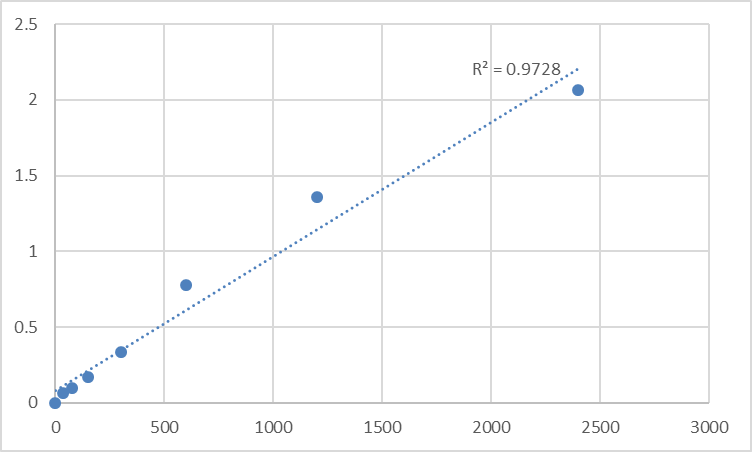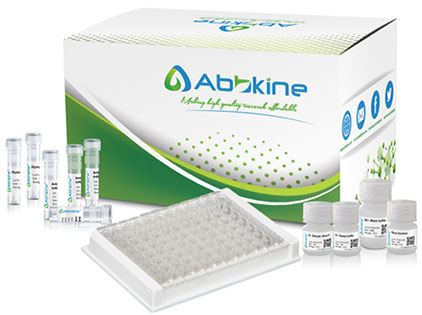| Product name | Human Maternal embryonic leucine zipper kinase (MELK) ELISA Kit |
| Reactivity | Human |
| Applications | ELISA |
| Applications notes | This Human Maternal embryonic leucine zipper kinase (MELK) ELISA Kit employs a two-site sandwich ELISA to quantitate MELK in samples. An antibody specific for MELK has been pre-coated onto a microplate. Standards and samples are pipetted into the wells and anyMELK present is bound by the immobilized antibody. After removing any unbound substances, a biotin-conjugated antibody specific for MELK is added to the wells. After washing, Streptavidin conjugated Horseradish Peroxidase (HRP) is added to the wells. Following a wash to remove any unbound avidin-enzyme reagent, a substrate solution is added to the wells and color develops in proportion to the amount of MELK bound in the initial step. The color development is stopped and the intensity of the color is measured. |
| Detection method | Colorimetric |
| SampleType | Cell culture supernatants, Other biological fluids, Plasma, Serum |
| Assay type | Sandwich ELISA (quantitative) |
| Assay duration | Multiple steps standard sandwich ELISA assay with a working time of 3-5 hours. It depends on the experience of the operation person. |
| Alternative | MELK; RP11-8N6.1; HPK38; KIAA0175; pEg3 kinase |
| Kit components | • Human Maternal embryonic leucine zipper kinase microplate • Human Maternal embryonic leucine zipper kinase standard • Human Maternal embryonic leucine zipper kinase detect antibody • Streptavidin-HRP • Standard diluent • Assay buffer • HRP substrate • Stop solution • Wash buffer • Plate covers |
| Features & Benefits | Human Maternal embryonic leucine zipper kinase (MELK) ELISA Kit has high sensitivity and excellent specificity for detection of Human MELK. No significant cross-reactivity or interference between Human MELK and analogues was observed. |
| Calibration range | Please inquire |
| Limit of detection | Please inquire |
| Usage notes | • Do not mix components from different kit lots or use reagents beyond the kit expiration date. • Allow all reagents to warm to room temperature for at least 30 minutes before opening. • Pre-rinse the pipet tip with reagent, use fresh pipet tips for each sample, standard and reagent to avoid contamination. • Unused wells must be kept desiccated at 4 °C in the sealed bag provided. • Mix Thoroughly is very important for the result. It is recommended using low frequency oscillator or slight hand shaking every 10 minutes. • It is recommended that all samples and standards be assayed in duplicate or triplicate. |
| Storage instructions | The unopened kit should be stored at 2 - 8°C. After opening, please store refer to protocols. |
| Shipping | Gel pack with blue ice. |
| Precautions | The product listed herein is for research use only and is not intended for use in human or clinical diagnosis. Suggested applications of our products are not recommendations to use our products in violation of any patent or as a license. We cannot be responsible for patent infringements or other violations that may occur with the use of this product. |
| Background | MELK (Maternal Embryonic Leucine Zipper Kinase) is a Protein Coding gene. Among its related pathways are Neuroscience. GO annotations related to this gene include calcium ion binding and protein kinase activity. An important paralog of this gene is PRKAA1. Serine/threonine-protein kinase involved in various processes such as cell cycle regulation, self-renewal of stem cells, apoptosis and splicing regulation. Has a broad substrate specificity; phosphorylates BCL2L14, CDC25B, MAP3K5/ASK1 and ZNF622. Acts as an activator of apoptosis by phosphorylating and activating MAP3K5/ASK1. Acts as a regulator of cell cycle, notably by mediating phosphorylation of CDC25B, promoting localization of CDC25B to the centrosome and the spindle poles during mitosis. Plays a key role in cell proliferation and carcinogenesis. Required for proliferation of embryonic and postnatal multipotent neural progenitors. Phosphorylates and inhibits BCL2L14, possibly leading to affect mammary carcinogenesis by mediating inhibition of the pro-apoptotic function of BCL2L14. Also involved in the inhibition of spliceosome assembly during mitosis by phosphorylating ZNF622, thereby contributing to its redirection to the nucleus. May also play a role in primitive hematopoiesis. |
| Gene ID | 9833 |
| Alternative | MELK; RP11-8N6.1; HPK38; KIAA0175; pEg3 kinase |
| Accession | Q14680 |

Fig.1. Human Maternal embryonic leucine zipper kinase (MELK) Standard Curve.

Fig.2. Abbkine ELISA kit is series of sandwich ELISA to quantitate specific protein in samples.
You must be logged in to post a review.
Reviews
There are no reviews yet.